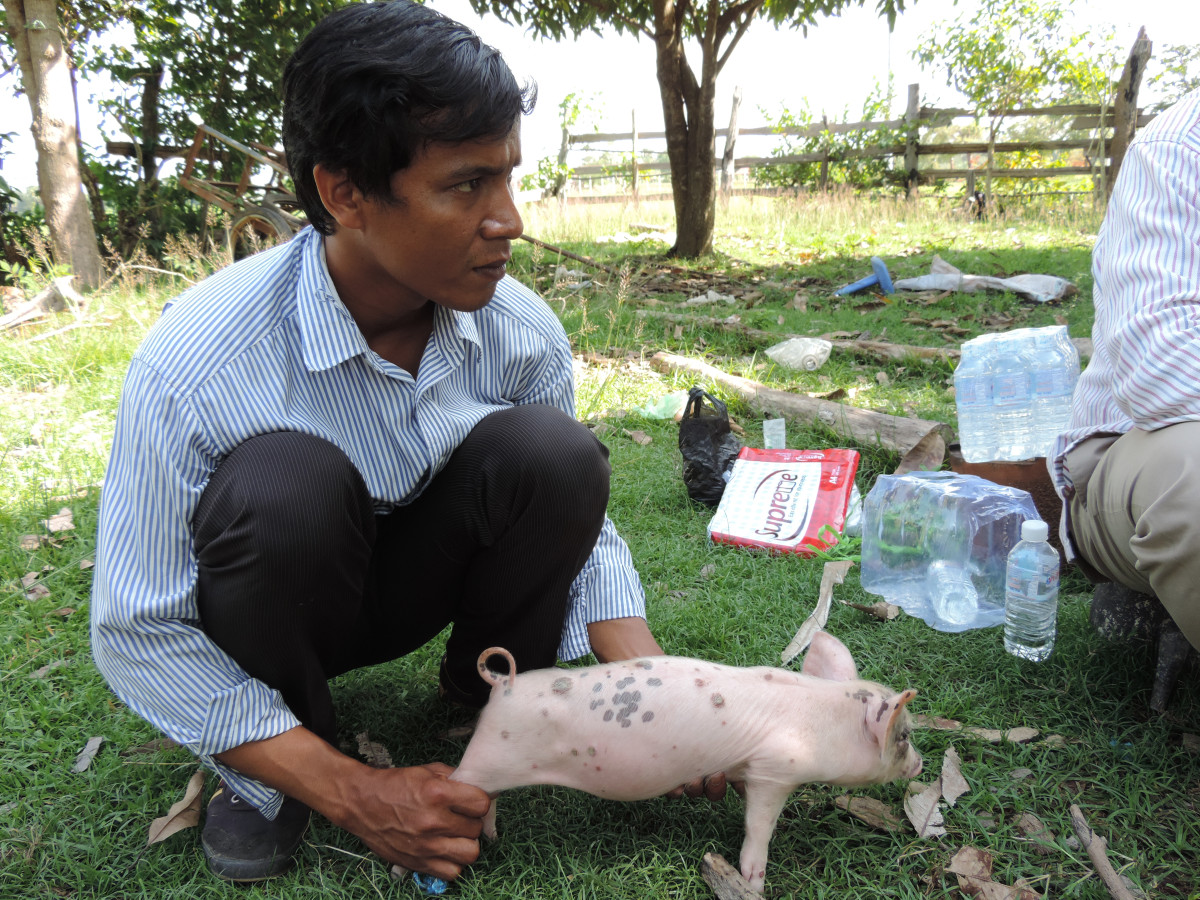“I improved livestock production in the village and I can train farmers,” says Leuk, a Cambodian vet
Published: Apr 14, 2014 Reading time: 4 minutes Share: Share an articleRice cultivation and livestock farming are the main sources of income for the majority of the population in the central province of Pursat, Cambodia. This is the case for farmer Leuk Chheana’s family of eleven who reside in the village of Chheuteal Kpus. However, Leuk has taken on extra responsibilities – in 2007 he became the local veterinarian.

Local farmers have been faced with many problems that prevent them from fully taking advantage of all that livestock farming has to offer. The high mortality rate of animals in this area is primarily caused by the lack of disease prevention, technical knowledge and medical skills. This is what inspired Chheana to make his decision to become a veterinarian. “I wanted to know how to prevent my animals from constantly becoming sick and it gave me an opportunity to increase my households income,” says Leuk Chheana.
Leuk, official veterinarian in Chheutela Kpusu is one of the 250 vets supported by Community Livestock Development Project (CLIMAD). The project is implemented in the provinces of Pursat and Kampong Chhnang by People in Need and our five local partner organizations thanks to the support of European Union and Czech Development Agency. The goal of the project is to establish a market-oriented system in which farmers have better access to quality veterinary and consultation services. This will allow farmers to improve their livelihoods and increase their household income.
A prerequisite for this is to ensure that there is a high level of expertise amongst veterinarians so that they can build the credibility of their services. Leuk and almost one hundred other vets attended numerous training sessions that focused on poultry, pigs and cattle. “The training provided me with valuable technical knowledge in addition to giving me the opportunity to try a variety of practical skills associated with livestock. As a result, I was able to increase my breeding ability. I now have 25 chickens, six buffaloes and two cows,” says Leuk.
In addition to technical training, Leuk focused on his ability to pass on his knowledge and skill set to others. He learned presentation and communication skills that dealt with training farmers. ”I was always afraid to speak in front of large groups of people. Now, I think that I have more confidence and the ability to provide quality veterinary advice to farmers,” says Leuk about the benefits of his training.
Leuk used his newly acquired technical, presentation and communication skills during a promotional campaign organized by the People in Need and our partner organizations. Leuk presented to fifty farmers from his village. He spoke about disease prevention, answered farmers’ questions and distributed leaflets with his phone number. This promotional campaign affected the farmers’ demand for his services.
“Before, I used to only have one client per month. Thanks to the promotional campaign, people know who I am and rely on my services. It’s only mid-March and I’ve had ten clients. I vaccinated poultry or provided advice on how to build chicken coops,“ said Leuk. The higher demand for his services has also affected the income of the household. During the first half of March, Leuk earned 300,000 riel (about 1,500 CZK) for his veterinary services.
Now, vets can pass on their knowledge and skills to others. Small groups of farmers rearing livestock in during the upcoming weeks are attending practical training focused on poultry, pigs and cows. “Now, field workers are coming together to aid one another with individual training. In my village there are five Livestock Farmers Networks (that have a total of 80 members) and I will teach them how to deal with poultry and other livestock,” says Leuk about his plans for next week. Overall, in both provinces, there are 347 networks like this one with over 4200 farmers who are receiving training from 95 rural veterinarians who are involved in the first phase of the project.
“Thanks to this project, I can now improve livestock production and my household income in addition to training other farmers and providing them with veterinary service. My goal is to get more clients and increase the quality of services, which will contribute to improving the livelihoods if the farmers in my village, “ says Leuk confidently.
The assistance for vets and thousands of farmers like Mr. Leuk in Kampong Chhnang Pursat would not have been possible without the support of the European Union and the Czech Development Agency under the trilateral cooperation projects.
